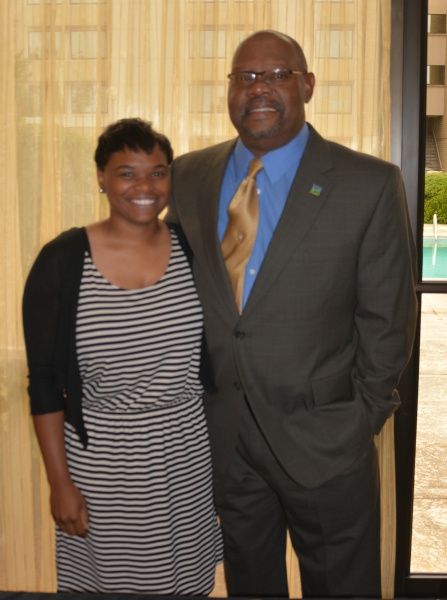
My journey started in 2007 when doctors informed me that my kidneys were failing, and I would likely require dialysis within the next year or so. No one in my family had received a similar diagnosis before, so we took it one day at a time. True to the doctor’s word, my kidneys continued to decline, and I started dialysis in 2009. In fact, my first day of dialysis was January 12, 2009: my daughter’s birthday [at that time, she was a senior in high school.]
Because I wanted to be able to watch my daughter play basketball and remain a coach, I opted to complete my dialysis at home. My wife and I both underwent the training, which was difficult for me as I have a huge fear of needles. I spent 2.5 hours, six days each week, hooked up the machine. But, I wouldn’t allow my treatment to get me down, especially in front of my daughter. I simply viewed it as a 2.5 hour delay to my day.
I continued to coach the JV girls’ team at D.H. Conley while on dialysis. The biggest change, outside of my delayed day, was changing my diet and social habits. As my eventual transplant date loomed, I became more concerned about contracting a virus or other illness, which could have prevented me from receiving a transplant. For the last six months before my transplant, I was more of a homebody, not hanging out with the guys but continuing to press on and think positively.
I was listed at Vidant Medical Center for my transplant. The first call came in August 2011. The transplant coordinator informed me the kidney was from a high risk donor (IV drug user), and I made the decision to turn the kidney down. Then, in 2012 three of us listed were called in for a potential match. Unfortunately, I was not the match for that kidney.
Lucky number three? Not quite. The third call came at 5:00am to let me know a kidney was available. I woke my daughter up that morning to let her know before I headed to the transplant center. The sheer look of relief on her face that I was not going to need dialysis anymore was enormous. I was prepped for surgery, including being put under. When I woke up, I thought: “Wow! My doctor did such a great job. I don’t feel any pain or see any big scar.” Soon after, my doctor worked in with tears in her eyes as she explained the kidney had been damaged during the recovery and was not able to be transplanted. Coming home and having to tell my daughter that I did not receive the kidney was one of the most difficult things imaginable as her father.
Finally, on October 14, 2012, I received the final call. A kidney was waiting for me. At this point, I just wanted to get the surgery over, as I have a low threshold for pain. Also, it was difficult to allow others to care for me during the recovery process [some might say I’m an independent person!]
I started to think about contacting my donor family when I started volunteering with Carolina Donor Services. I want the family to know how appreciative I am for the gift their loved one gave to me, and I also want them to know what I’m doing to spread awareness and bring the message of organ donation to communities across North Carolina.
One of the biggest takeaways I had from my transplant experience was the vast array of people it required for the process to take place: from nurses and physicians, to the coordinators, to the cleaning crew. In particular, I was aware of the diversity within these different groups. People came together from all races, ethnicities, genders, religious orientations, ages, and more to ensure my transplant was a success. I think that’s such a profound image to carry forward. Organ donation and transplantation is not something that just affects one group of people but requires us to come together as a community to save lives, honor wishes, and bring hope to those who wait. It takes everyone for the process to happen.